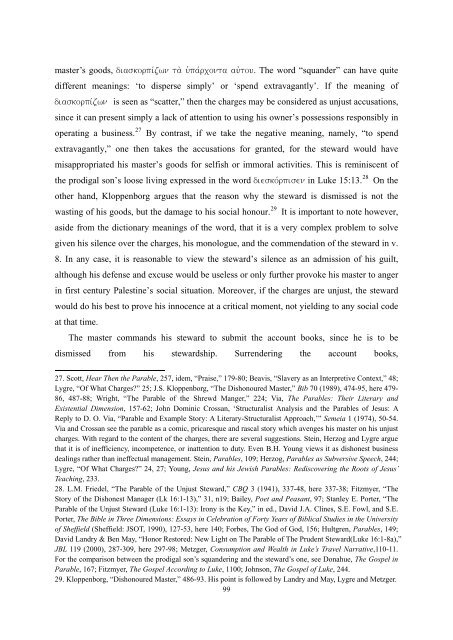the role of the lukan parables in terms of the purpose of luke's gospel
the role of the lukan parables in terms of the purpose of luke's gospel
the role of the lukan parables in terms of the purpose of luke's gospel
You also want an ePaper? Increase the reach of your titles
YUMPU automatically turns print PDFs into web optimized ePapers that Google loves.
master’s goods, . The word “squander” can have quite<br />
different mean<strong>in</strong>gs: ‘to disperse simply’ or ‘spend extravagantly’. If <strong>the</strong> mean<strong>in</strong>g <strong>of</strong><br />
is seen as “scatter,” <strong>the</strong>n <strong>the</strong> charges may be considered as unjust accusations,<br />
s<strong>in</strong>ce it can present simply a lack <strong>of</strong> attention to us<strong>in</strong>g his owner’s possessions responsibly <strong>in</strong><br />
operat<strong>in</strong>g a bus<strong>in</strong>ess. 27 By contrast, if we take <strong>the</strong> negative mean<strong>in</strong>g, namely, “to spend<br />
extravagantly,” one <strong>the</strong>n takes <strong>the</strong> accusations for granted, for <strong>the</strong> steward would have<br />
misappropriated his master’s goods for selfish or immoral activities. This is rem<strong>in</strong>iscent <strong>of</strong><br />
<strong>the</strong> prodigal son’s loose liv<strong>in</strong>g expressed <strong>in</strong> <strong>the</strong> word <strong>in</strong> Luke 15:13. 28 On <strong>the</strong><br />
o<strong>the</strong>r hand, Kloppenborg argues that <strong>the</strong> reason why <strong>the</strong> steward is dismissed is not <strong>the</strong><br />
wast<strong>in</strong>g <strong>of</strong> his goods, but <strong>the</strong> damage to his social honour. 29<br />
It is important to note however,<br />
aside from <strong>the</strong> dictionary mean<strong>in</strong>gs <strong>of</strong> <strong>the</strong> word, that it is a very complex problem to solve<br />
given his silence over <strong>the</strong> charges, his monologue, and <strong>the</strong> commendation <strong>of</strong> <strong>the</strong> steward <strong>in</strong> v.<br />
8. In any case, it is reasonable to view <strong>the</strong> steward’s silence as an admission <strong>of</strong> his guilt,<br />
although his defense and excuse would be useless or only fur<strong>the</strong>r provoke his master to anger<br />
<strong>in</strong> first century Palest<strong>in</strong>e’s social situation. Moreover, if <strong>the</strong> charges are unjust, <strong>the</strong> steward<br />
would do his best to prove his <strong>in</strong>nocence at a critical moment, not yield<strong>in</strong>g to any social code<br />
at that time.<br />
The master commands his steward to submit <strong>the</strong> account books, s<strong>in</strong>ce he is to be<br />
dismissed from his stewardship. Surrender<strong>in</strong>g <strong>the</strong> account books,<br />
27. Scott, Hear Then <strong>the</strong> Parable, 257, idem, “Praise,” 179-80; Beavis, “Slavery as an Interpretive Context,” 48;<br />
Lygre, “Of What Charges?” 25; J.S. Kloppenborg, “The Dishonoured Master,” Bib 70 (1989), 474-95, here 479-<br />
86, 487-88; Wright, “The Parable <strong>of</strong> <strong>the</strong> Shrewd Manger,” 224; Via, The Parables: Their Literary and<br />
Existential Dimension, 157-62; John Dom<strong>in</strong>ic Crossan, ‘Structuralist Analysis and <strong>the</strong> Parables <strong>of</strong> Jesus: A<br />
Reply to D. O. Via, “Parable and Example Story: A Literary-Structuralist Approach,’” Semeia 1 (1974), 50-54.<br />
Via and Crossan see <strong>the</strong> parable as a comic, pricaresque and rascal story which avenges his master on his unjust<br />
charges. With regard to <strong>the</strong> content <strong>of</strong> <strong>the</strong> charges, <strong>the</strong>re are several suggestions. Ste<strong>in</strong>, Herzog and Lygre argue<br />
that it is <strong>of</strong> <strong>in</strong>efficiency, <strong>in</strong>competence, or <strong>in</strong>attention to duty. Even B.H. Young views it as dishonest bus<strong>in</strong>ess<br />
deal<strong>in</strong>gs ra<strong>the</strong>r than <strong>in</strong>effectual management. Ste<strong>in</strong>, Parables, 109; Herzog, Parables as Subversive Speech, 244;<br />
Lygre, “Of What Charges?” 24, 27; Young, Jesus and his Jewish Parables: Rediscover<strong>in</strong>g <strong>the</strong> Roots <strong>of</strong> Jesus’<br />
Teach<strong>in</strong>g, 233.<br />
28. L.M. Friedel, “The Parable <strong>of</strong> <strong>the</strong> Unjust Steward,” CBQ 3 (1941), 337-48, here 337-38; Fitzmyer, “The<br />
Story <strong>of</strong> <strong>the</strong> Dishonest Manager (Lk 16:1-13),” 31, n19; Bailey, Poet and Peasant, 97; Stanley E. Porter, “The<br />
Parable <strong>of</strong> <strong>the</strong> Unjust Steward (Luke 16:1-13): Irony is <strong>the</strong> Key,” <strong>in</strong> ed., David J.A. Cl<strong>in</strong>es, S.E. Fowl, and S.E.<br />
Porter, The Bible <strong>in</strong> Three Dimensions: Essays <strong>in</strong> Celebration <strong>of</strong> Forty Years <strong>of</strong> Biblical Studies <strong>in</strong> <strong>the</strong> University<br />
<strong>of</strong> Sheffield (Sheffield: JSOT, 1990), 127-53, here 140; Forbes, The God <strong>of</strong> God, 156; Hultgren, Parables, 149;<br />
David Landry & Ben May, “Honor Restored: New Light on The Parable <strong>of</strong> The Prudent Steward(Luke 16:1-8a),”<br />
JBL 119 (2000), 287-309, here 297-98; Metzger, Consumption and Wealth <strong>in</strong> Luke’s Travel Narrative,110-11.<br />
For <strong>the</strong> comparison between <strong>the</strong> prodigal son’s squander<strong>in</strong>g and <strong>the</strong> steward’s one, see Donahue, The Gospel <strong>in</strong><br />
Parable, 167; Fitzmyer, The Gospel Accord<strong>in</strong>g to Luke, 1100; Johnson, The Gospel <strong>of</strong> Luke, 244.<br />
29. Kloppenborg, “Dishonoured Master,” 486-93. His po<strong>in</strong>t is followed by Landry and May, Lygre and Metzger.<br />
99
















